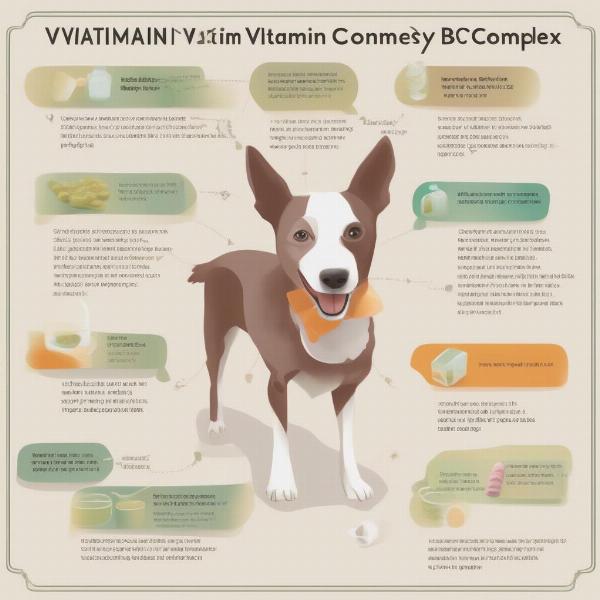Vitamin B complex plays a crucial role in a dog’s overall health and well-being. From maintaining healthy nerve function to supporting a shiny coat, these essential nutrients are vital for every stage of a dog’s life. Understanding the benefits, sources, and potential risks of vitamin B complex supplementation can help you make informed decisions about your dog’s nutritional needs.
Understanding the B Vitamins and Their Importance
The B vitamin complex is a group of eight essential water-soluble vitamins that work synergistically to support various bodily functions. These include:
- B1 (Thiamine): Crucial for carbohydrate metabolism, nerve function, and muscle function.
- B2 (Riboflavin): Important for energy production, cell function, and healthy skin and coat.
- B3 (Niacin): Supports the digestive system, skin health, and nerve function.
- B5 (Pantothenic Acid): Essential for hormone production, red blood cell formation, and energy metabolism.
- B6 (Pyridoxine): Plays a vital role in brain development, red blood cell formation, and immune function.
- B7 (Biotin): Important for cell growth, healthy skin and coat, and proper metabolism of fats and carbohydrates.
- B9 (Folate): Essential for cell division, growth, and red blood cell formation.
- B12 (Cobalamin): Supports nerve function, red blood cell formation, and DNA synthesis.
A deficiency in any of these B vitamins can lead to a range of health problems, from skin issues and digestive upset to neurological disorders and anemia.
When Should You Consider Vitamin B Complex for Your Dog?
While a balanced diet typically provides sufficient B vitamins, certain situations may warrant supplementation. These include:
- Poor Diet: Dogs fed low-quality commercial food or homemade diets may not receive adequate amounts of B vitamins.
- Digestive Issues: Conditions like inflammatory bowel disease or chronic diarrhea can hinder nutrient absorption, including B vitamins.
- Stress: Stressful situations, such as moving or changes in routine, can deplete B vitamin levels.
- Older Dogs: Senior dogs may have difficulty absorbing nutrients, potentially leading to B vitamin deficiencies.
- Certain Medications: Some medications can interfere with B vitamin absorption.
- Specific Health Conditions: Your veterinarian may recommend B vitamin supplements for dogs with certain neurological or skin conditions.
Choosing the Right Vitamin B Complex Supplement
 Choosing the Right Vitamin B Complex Supplement for Dogs
Choosing the Right Vitamin B Complex Supplement for Dogs
When selecting a vitamin B complex supplement for your dog, consult your veterinarian. They can help determine the appropriate dosage and recommend a high-quality product. Look for supplements specifically formulated for dogs, and choose a form that is palatable for your pet. Common forms include tablets, chews, and liquids.
Potential Risks and Side Effects
While vitamin B complex is generally safe for dogs, excessive intake can lead to potential side effects such as:
- Gastrointestinal upset: Vomiting and diarrhea
- Liver damage (in rare cases with extremely high doses)
- Increased thirst and urination
Always follow your veterinarian’s recommended dosage and monitor your dog for any adverse reactions.
What are the signs of Vitamin B deficiency in dogs?
Recognizing the signs of B vitamin deficiency in your dog is important. These can include:
- Skin problems: Dry, flaky skin, hair loss, itching
- Neurological issues: Seizures, weakness, tremors
- Gastrointestinal problems: Loss of appetite, vomiting, diarrhea
- Lethargy and fatigue
best food for cocker spaniel dogs
If you suspect your dog is deficient in B vitamins, consult your veterinarian for diagnosis and treatment.
Ensuring Your Dog Gets Enough B Vitamins
A balanced diet is the best way to ensure your dog receives adequate B vitamins. Foods rich in B vitamins include:
- Organ meats (liver, kidney)
- Eggs
- Fish
- Whole grains
- Brewer’s yeast
- Leafy green vegetables
Conclusion
Vitamin B complex plays a critical role in maintaining your dog’s overall health. While a balanced diet typically provides sufficient B vitamins, supplementation may be necessary in certain situations. Consult your veterinarian to determine if vitamin B complex is appropriate for your dog and to ensure you choose a safe and effective product. By prioritizing your dog’s nutritional needs, you can contribute to their long-term health and well-being.
FAQ
- What is the best way to give my dog vitamin B complex? Follow your veterinarian’s instructions and choose a palatable form, such as chews or tablets.
- Can I give my dog human vitamin B complex? No, always use supplements specifically formulated for dogs. Human supplements may contain ingredients harmful to dogs.
- How long does it take to see results from vitamin B complex supplementation? This varies depending on the dog and the reason for supplementation. You may notice improvements in skin and coat health within a few weeks.
- Are there any interactions between vitamin B complex and other medications? Consult your veterinarian about potential interactions with any medications your dog is currently taking.
- Can too much vitamin B complex be harmful to my dog? Yes, excessive intake can lead to side effects. Follow your veterinarian’s recommended dosage.
- What are the best sources of vitamin B complex for dogs? A balanced diet including organ meats, eggs, fish, and whole grains is a good source of B vitamins.
- Can I give my dog vitamin B complex if they are pregnant or nursing? Consult your veterinarian before giving any supplements to pregnant or nursing dogs.
state fair corn dogs nutrition
ILM Dog is a leading international pet website dedicated to providing dog owners with reliable, practical advice on all aspects of dog care and wellbeing. From breed selection and nutrition to training and health, ILM Dog offers expert guidance to help you provide the best possible care for your canine companion. We specialize in dog breeds, health and medical care, training and behavior, nutrition and feeding, grooming, products, and accessories. Contact us at [email protected] or +44 20-3965-8624 for expert advice and personalized support.